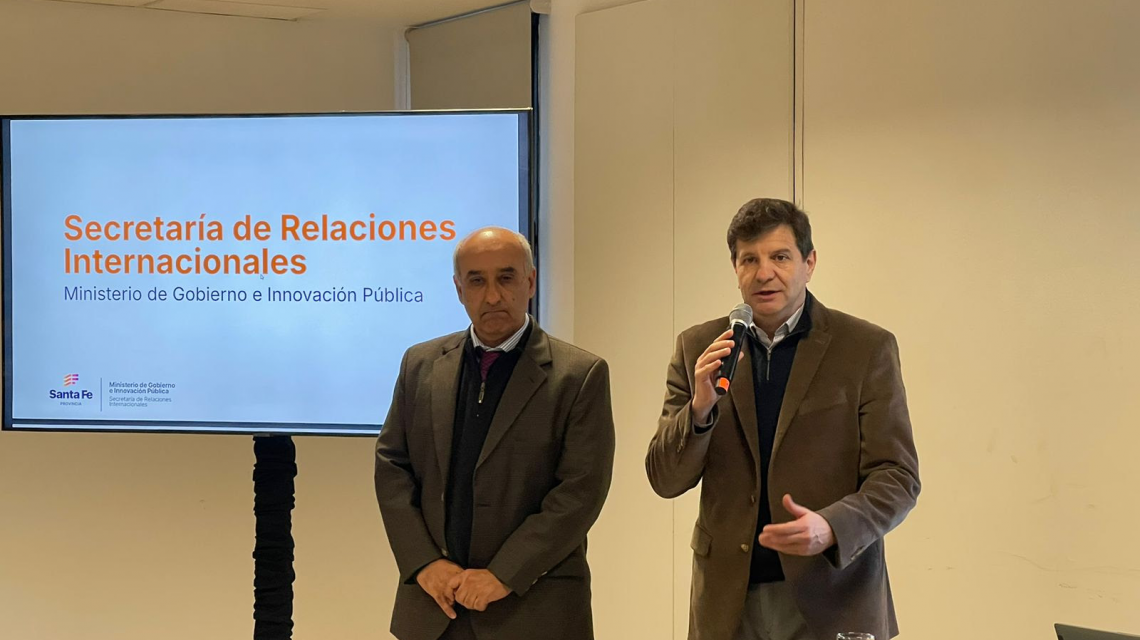Working instances generated by the Secretariat of International Relations of the province of Santa Fe, under the Ministry of Government and Public Innovation, brought together last week municipalities and municipalities in two meetings, one held in Rosario with localities in the south and the other in Santa Fe, with those of the north-central Santa Fe.
The event was the Participatory Diagnostic Workshop in the framework of the Territorialisation of International Relations Programme, an initiative for local governments to work on internationalisation strategies, with the aim of identifying priorities to strengthen institutional capacities in their international action and enhance local development in all its dimensions.
The provincial secretary of International Relations, Claudio Díaz, explained that "it is an activity that we have thought of from the Ministry of Government with the aim of bringing our foreign policy closer to the territories of the municipalities and communes". And he said that "we are doing it in the form of a workshop, because we want learning and projects to come out of it".
"We want something that seems distant, such as international relations, to be at the service of municipalities and communes in order to solve the problems they face every day; and by seeking international cooperation, international funds, with a specialised team, to generate collaboration along the way".
Finally, Díaz said: "With the government of Maximiliano Pullaro, we seek to solve everyday problems, with three very clear axes, which are security, education and production. We try to mould this search so that the presidents of communes, mayors and technical teams can see their city or commune projects more closely, how to associate with other municipalities and communes, and where to look for funds or international cooperation".
Leading role
For his part, the mayor of San Justo, Nicolás Cuesta, who was one of the speakers at the meeting in the central north, said that "we are very pleased to join this event because it is something that was proposed before I took office, by defining this space for internationalisation with training, a special dedication to train mayors and their teams in different areas".
In this sense, he said that "the municipalities have a more leading role in the world, in Argentina and in our province. To take on this leading role in decision-making, it is very important to understand what cities are doing at the international level, what international organisations are setting parameters for action in different areas, in climate, education and urban planning, among other issues.
In the meeting held with the local governments of the south of the province, the mayor of Venado Tuerto, Leonel Chiarella, presented his experience: "the internationalisation of cities and municipalities is a path to follow because it adds value to local technical teams, allows us to think about the future, allows us to position our communities, teaches us a new way of working and management and exchange tools that we would not have access to in other ways".
"From the internationalisation experience of Venado Tuerto, the recommendation is that they join the International Relations Territorialisation Programme of the International Relations Secretariat. This team will be able to accompany them not only through their technical capacities but also through their human qualities", emphasized Chiarella.
The Secretary of Government, Municipalities and Communes, Horacio Cianco, and the Undersecretary of Municipalities and Communes, Marina Bordigoni, also participated in the meetings.
Provincial programme
The objectives of the programme are to promote a territorial management strategy for the internationalisation process in the province of Santa Fe; to strengthen the institutional capacities of Santa Fe local governments to attract technical assistance and economic resources among the various actors and mechanisms of the international system; to enhance the identity of local governments as an instrument for their international insertion; and to promote the appropriation of the goals and targets of the 2030 Agenda according to the demands and opportunities at the local level.
